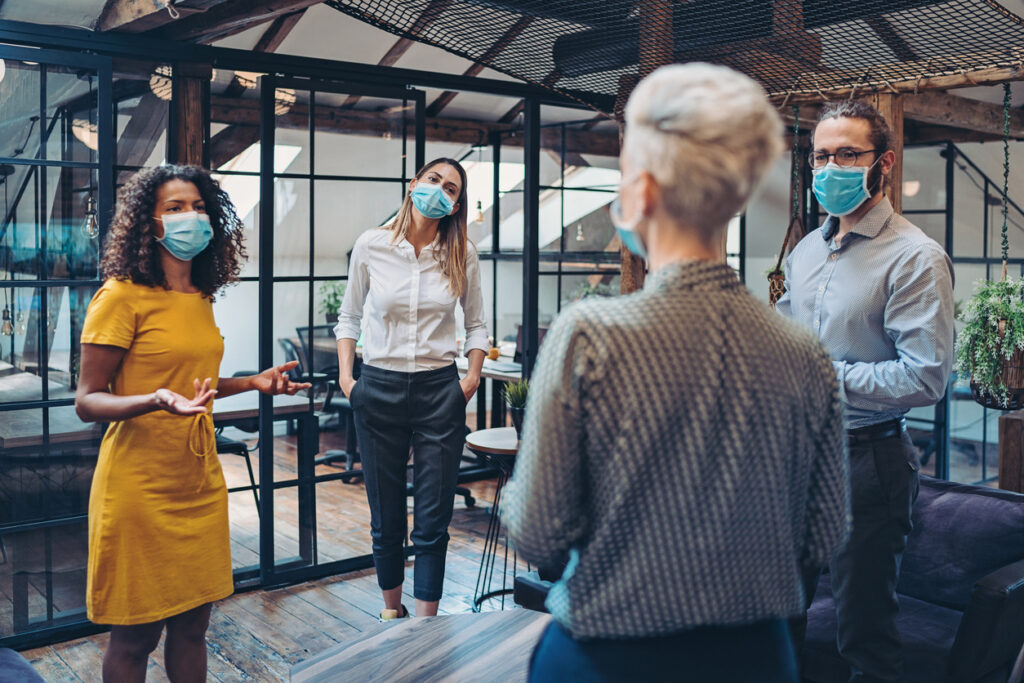We’ve lived this past year in the shadow of death – over 125,000 of them in the UK since the start of the pandemic. It has been life altering, leaving survivors to question, seek, make adjustments and reconsider the future. With the vaccine roll out continuing apace and the light at the end of the tunnel no longer flickering, businesses need to start implementing their wellbeing plans now in order to boost recovery. It’s crucial that we shore up the sense of positivity people are feeling right now, as we grapple with the long-term effects of Covid-19 in the months ahead.
As we start the long road to recovery, it is essential that we create the warmth our people are sorely in need of.
Now is the time for leaders to review their organisational culture, people policies, employee benefits structure and communications streams to improve the employee experience. Despite what we are tempted to think, life and work will never be the same again, and it is naive to think it will all go back to ‘business as usual’ once the virus is firmly under control globally. The after-effects of Covid-19 will be with us for a long time, so organisations must ensure they take appropriate measures now to ensure their teams are prepared.
Assessing the damage
Medical professionals are still getting to grips with the long-term effects of Covid-19 but it’s already clear for that for some people the virus can cause symptoms that last weeks or months after the infection has gone. This is sometimes called ‘long Covid’ and it comes with a range of physical symptoms.
In addition, the virus and the pandemic itself has been shown to have a negative effect on people’s mental health, with almost one in five adults suffering some form of depression during the pandemic (double the number of the previous year).
There is also research linking the long-term impact of Covid-19 with a number of mental health issues including:
- Anxiety
- Obsessive compulsive disorder (OCD)
- Personality disorder
- Stress
- Exhaustion
- Post traumatic stress disorder (PTSD)
It has been proven that mental ill health of any kind can lead to disengagement, presenteeism and employee absence, all of which severely affects wellbeing and, ultimately, productivity.
How, then, can organisations equip their people to take on the constantly changing Covid-19 landscape from a position of strength and good mental wellbeing? It requires both a proactive and reactive response – in other words, adopting a holistic approach that links safety, learning and development, social, financial and fun. Here are some of the key elements this could include.
Psychometric testing and coaching
Before we can start to empower employees to take charge of their own wellbeing, we need to understand where their heads are at. This is why psychometric testing should be done as often as twice a year if possible. Psychometrics are situation dependent, and people’s responses to such testing can completely change when they’ve been through trauma. DiSC profiles offer a flexible and diverse picture of the individual and can provide a useful indicator of how an employee’s outlook has changed based on their environment and stress level.
Mental health first aid (MHFA)
Some people give MHFA a bad rep, demanding to see statistics of its success, discounting the very personal unique experiences of people who have been saved and positively impacted by mental health first aiders. At the moment, I daresay that MHFA and other forms of wellbeing and happiness at work strategies fall into the reported 500% return on investment that was reported by Deloitte.
Here is a extract from Deloitte’s January 2020 report on Mental Refreshing:
“The results of our updated ROI analysis show a financial case in favour of employers investing in mental health. We now find that on average employers obtain a return of £5 for every £1 (5:2:1) invested, up from £4 for every £1 spent (4.0:1) in our previous report. However there is a wide spread of returns from 0.4:1 all the way up to 11:1. Interventions that achieve higher returns tend to have the following characteristics:
- They offer a large‐scale culture change, or organisation‐wide initiatives supporting large numbers of employees.
- They are focused on prevention or designed to build employee resilience.
- They use technology or diagnostics to tailor support for those most at risk.
“We find that there is more that employers can be doing to support mental health among the workforce. In particular, more can be done to tackle the stigma associated with mental health problems, increase awareness, and provide adequate training for employees”.
It’s clear from this report that organisations should invest in equipping some employees to support colleagues, by providing mental health first aid. It is, however, vital that you not only select those who are social, interactive, firm and whom others feel connected to, but that you also provide support for those selected. It should be a 360* of support where each person (both the supported and supporter) have access to help. This is because you cannot pour from an empty cup, and it is draining to constantly offer support to others.
Employee benefits
Perks are great. What more can you do to improve the benefits your people get? Access to financial education that helps them discover their money types and how to best use it to make the most of their funds? Education about different ways to save? Access to specially curated discounts at essentials like dental care, optics, grocery, energy, etc? Think carefully about which benefits can offer the most value in the current climate and what employees would appreciate the most.
[cm_form form_id=’cm_65a14c3f5da64′]
As we start the long road to recovery, it is essential that we create the warmth our people are sorely in need of, having been inundated with chills from the news of so much death. At this stage we need to do a lot more than simply ask if they need a cup of tea – go ahead and make the tea, bring them the tea, add a biscuit! We could all use a little more caring and kindness in the months ahead.
Interested in this topic? Read How Covid-19 will impact employee wellbeing in the long term.







